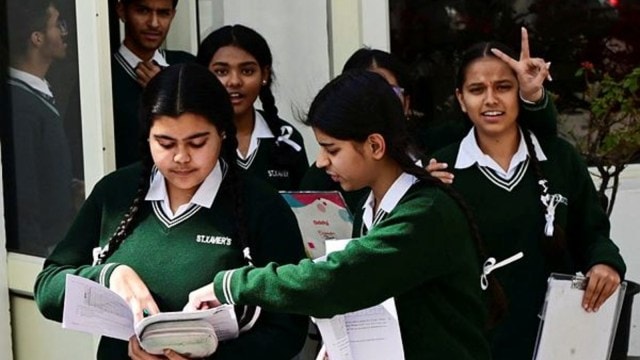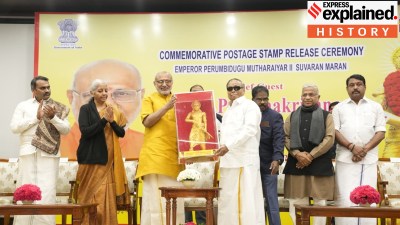CBSE Board Exams 2025 Analysis: How was Class 12th Economics paper today?
CBSE Class 12 Economics Analysis: Economics exam today was held for 80 marks and was to be attempted within 3 hours. The paper was divided into two sections - Section A (Macro Economics) and Section B (Indian Economic Development).
 Once released, students can check their scores on the official websites: interresult2025.com, interbiharboard.com. (Express Photo by Kamleshwar Singh/ representative)
Once released, students can check their scores on the official websites: interresult2025.com, interbiharboard.com. (Express Photo by Kamleshwar Singh/ representative)The Central Board of Secondary Education (CBSE) on March 19 conducted the economics paper for Class 12. The Class 12 economics was held for 80 marks in total for a duration of three hours. The paper according to students was easy to moderate.
According to Kirti Khokher, PGT Economics, Global Indian International School, Noida, all the questions were strictly based on the prescribed syllabus, with no out-of-syllabus content.
“Macro economics was easy and Indian Economic Development was a bit tricky. The paper featured a significant number of competency-based questions, emphasising the practical application of theoretical concepts. Overall the paper maintains a balance between easy and complex questions. The well-structured mix required students to carefully read and analyze each question before answering, effectively assessing their conceptual understanding and critical thinking skills,” Khokher said.
As per Anupam Agnihotri, PGT Economics at Silverline Prestige School, Ghaziabad, the question paper was for 80 marks with internal choices. The paper included a good mix of competency-based and moderate questions, which assesses the application of knowledge.
“The paper was average and the questions were mainly CBSE sample paper-based. Direct questions were straightforward to answer. The MCQs and competency-based questions were also of average difficulty, ensuring a balanced assessment. Students finished the paper well in time and were satisfied with the level of the paper. Overall all the sets were easy,” Agnihotri added while sharing the analysis of the CBSE paper.
Venkateson (PGT) Economics teacher at Jain International Residential School (JIRS), Bengaluru while analysing the paper said: “The CBSE Class 12 Economics paper was well-structured, covering all key topics as per the syllabus. The difficulty level was moderate, making it accessible for students who had prepared well. Numerical questions required careful calculations, ensuring that students with strong conceptual understanding could excel.”
“As per the blueprint, 20 per cent of the questions were competency-based, testing students’ analytical and application skills. Overall, the paper was balanced and fair. Students who practiced sample papers and textbook exercises were well-prepared and could score good marks,” the teacher added.
Narsingh Raghav, PGT Commerce, KIIT World School, Gurgaon said that the paper was simple and well balanced. Students found the level of difficulty as moderate, the teacher added saying that both the sections – A and B, in the paper were relatively easy.
“The question paper was a balanced mix of knowledge, analysis and application- based questions. MCQ questions were easy but needed a through reading. Case based questions were easy and there was no error found in the question paper. Language was very easy and proper reading of the question would make it accessible for the students. The paper was well balanced and could have been solved within stipulated time,” Raghav added.
According to Anthony Fernandes, Founder of Shaalaa.com, the 2025 Economics exam displayed a balanced approach, maintaining consistency in structure with last year’s paper but incorporating a noticeable shift towards application-based and analytical questions.
“Compared to 2024, the exam included a greater number of case studies, requiring students to apply theoretical concepts to real-world economic scenarios. While the multiple-choice section retained its weightage, long-answer questions demanded deeper understanding and synthesis of economic principles. Fernandes added.
“Additionally, the 2025 paper placed a stronger emphasis on contemporary economic policies and global economic trends, reflecting a dynamic shift in the curriculum. The difficulty level was slightly higher than last year, particularly in sections requiring data interpretation and policy evaluation. Students who focused on conceptual clarity and current economic affairs would have found the paper manageable. Overall, the exam rewarded analytical thinking over rote memorization, aligning with the evolving educational focus on critical reasoning and problem-solving,” the founder said.
Jay Girotra, educator at Shiv Nadar School, Noida analysed the paper as well-balanced and of moderate difficulty.
“While some found the case study question (Q34) in Indian Economic Development slightly challenging, overall, students demonstrated commendable performance, reflecting their strong grasp of the subject. The overall performance on the exam was commendable, reflecting the students’ solid understanding of the material. Post-exam discussions indicated a positive response, with students feeling confident about their attempts and expressing satisfaction with the fair and balanced nature of the assessment,” Girotra added.
Rushil Mishra, a student who appeared for the Class 12 economics exam from Shiv Nadar School, Noida said: “I was happy with the paper. It was easier than expected, and I did not anticipate finishing so well in advance.”
Ayatee Roy, another student from the same school found the Indian economy section a bit lengthy but easy to attempt. “All the MCQs were straightforward to solve,” the student added.
Sudeshna Bhattacharya, HOD economics at Seth Anandram Jaipuria School, Ghaziabad said that the exam was of easy-to-moderate level.
“The MCQs were concept-based in macroeconomics; in the Indian Economy they were from the NCERT itself. In macroeconomics, the (AD-AS) diagram based questions came as option with a descriptive question and the level was easy. Most of the questions were direct only and others were application-based. In Indian Economy a thorough reading of NCERT was required to answer the ques and they were of moderate level. Numerical questions were easy. Case studies as well as subjective questions were easy. Only 2-3 MCQs were tricky,” the HOD added.
Shreya Gambhir, who took the paper from Seth Anandram Jaipuria School, Ghaziabad found the paper above average.
“It had some questions that our teachers had already included in pre-board papers, so we knew how to answer those. Further, the paper was a little bit lengthy for me, but I managed to complete in time. The difficulty level was average to be honest, not too difficult but not easy either. The case studies had one question from passage; the rest 2 questions were from the book only,” the student added.
Soumya Dubey, another student from the same school said: “The Economics Class XII paper was overall easy. The questions were mostly direct and numericals were easy. MCQs required a bit of application but they were good too. Case studies were also direct and regular.”
- 01
- 02
- 03
- 04
- 05































